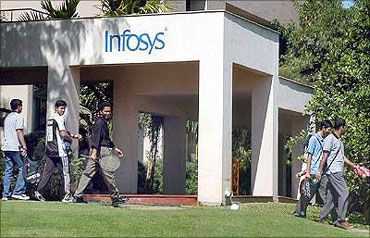
Setting new standards of corporate governance, Infosys has reacted proactively to concerns raised by proxy firms by filing detailed responses to the exchanges.
The clarifications, which came directly from the board of directors, pertain to three key resolutions which are up for vote through postal ballot, which is open till March 31.
Two of these pertain to the proposed 2015 stock incentive compensation plan and a third related to the reappointment of Jeffrey S Lehman as an independent director.
In a filing on Tuesday, Infosys said, “The board believes that all three resolutions are key to strategy execution and delivering shareholder value.”
Without naming any proxy firm, it said, “It is understood that certain proxy firms have recommended a voting against three of the items that have been proposed to be passed through postal ballot dated February 24, 2016.
"The Board of Infosys Limited has reviewed these reports and is sharing this response for shareholders to consider while making their decision.”
Of the three proxy advisory firms operating in India, Stakeholders’ Empowerment Services had opposed all the three resolutions, while Institutional Investor Advisory Services had opposed the one relating to the independent director.
Bengaluru-based InGovern Research said it made a note of the independent director whose tenure was exceeding 10 years, but said it took a “pragmatic” view, since the company had also acknowledged the issue.
But, InGovern did not recommend voting against any of these resolutions.
J N Gupta, managing director of SES, which had released its report on March 16, said, “We sent the same to the company the same day.
They have not sent any clarification to SES but sent a communication to BSE/NSE, etc.
"This is surprising, keeping in mind that while they are concerned that proxy advisory companies have issued AGAINST recommendation, they are not clarifying the issue to these firms but to the stock exchanges and general investors, who do not have these reports available.”
Gupta added, “. . . SES stands by its recommendation.”
On the stock incentive plan, the concerns were that there was no disclosure on the performance conditions for the grant of these stock incentives and that the delegation of authority to the administrator of the scheme was “unfettered” and obviates the need for shareholder approvals.
To this, the company clarified the scheme was just an extension of the 2011 restricted stock units plan and the Nominations and Remunerations Committee recognised in the Securities and Exchange Board of India regulations and the Companies Act is the administrator.
And, the authority delegated to it could be exercised within what is permitted under law. “Considering that the stock incentives would be granted over a period of four to seven years, it would be impractical to seek specific approvals for such parameters from the shareholders,” Infosys said in the exchange filing.
Gupta did not sound convinced.
“The logic of the company that it is nothing but the extension of employees’ stock option plan 2011 which was already approved by shareholders does not carry any weight and the justification is at best technical.
If shareholders approved something in the past, it does not mean that they will approve the same perpetually.”
Amit Tandon, managing director of IiAS, said the firm has issued a rejoinder to the Infosys statement.
IiAS had also opposed the reappointment of Lehman as independent director, citing his long tenure of nine years on the Infosys board, which affected his independence.
Also, the firms had pointed out his attendance record of less than 75 per cent in board meets.
Arguing that the company was in full compliance of Sebi and company law requirements, Infosys said as the average tenure of the other directors is just 2.1 years and the managing director himself is only 1.5 years into the job, Lehman “brings to the board unique and invaluable inputs bridging between past and current perspectives”.
It also pointed out how the last promoter-director had stepped down in October 2014 and most of the current board came in January 2014.
In its rejoinder, IiAS said, “IiAS believes that instead of debating the legality of Jeffrey Lehman’s reappointment, Infosys would be better placed in assessing what it should do as a good corporate governance practice.
Infosys has always looked at the bigger picture and set its standards on good governance well ahead of corporate India.
"Why, then, has it begun nitpicking on as obvious an issue as director rotation?”
Shriram Subramanian of InGovern Research saw the silver lining in the whole issue when he said that the Infosys board’s reaction showed that the company took the proxy firms seriously.
“This is how it is globally. Only if companies like Infosys do this will it percolate down to other firms. Infy is bringing this global practice to India; that is good.”
CORPORATE GOVERNANCE IN ACTION
Special resolutions for approval of 2015 stock incentive compensation plan and grant of stock incentives to eligible employees
Proxy view: Not enough disclosures on conditions for grant of options. Unfettered delegation to board, obviates need for shareholder approvals
Infy view: Plan is in continuation of a 2011 plan. To be administered by nominations and remuneration committee on terms within framework of law.
Case by case approvals from shareholders not practical
Special resolution for reappointment of Jeffery S Lehman, as an independent director
Proxy view: Reappointment to affect independence as he has already completed nine years in service
Infy view: Move compliant with laws. Average tenure of other board members only 2.1 years and the last promoter director stepped down a while ago. So, question of proximity does not arise.
Also, his experience will help bridge past and present perspectives












